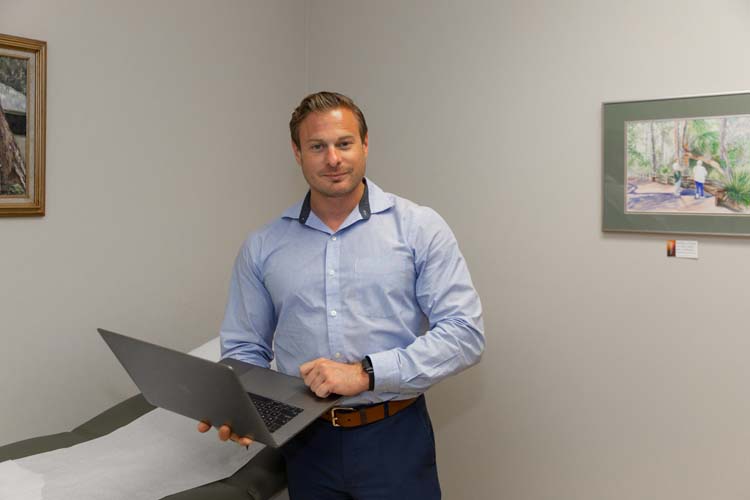
While most people think neurosurgeons like Dr. Jacob Januszewski mainly, or even exclusively, operate on patients’ brains, it turns out these highly specialized doctors actually spend much more time treating back pain related to the spine and nervous system.
Januszewski estimates the ratio in most neurosurgery practices as “about 80 percent spine and 20 percent brain,” and says that 80 percent includes treating a wide range of spine-related problems, including adult scoliosis correction, spinal deformities and malformations, laminectomies, cervical lumbar diseconomies and spinal fusions.
The ratio is not surprising in one sense, since the National Institutes of Health have found up to 70 percent of U.S. seniors suffer from back pain, and that spine-related problems “occur at much higher rates than brain disorders.”
Many of us will, especially as we age, need the help of a neurosurgeon like Januszewski.
That is the bad news.
The good news is these surgeons have extensive training, and spine surgery today is much improved compared to just a decade ago.
“Anyone who had spinal surgery before 2010, probably had it done wrong and [they] are now coming back with problems,” says Januszewski, whose credentials include a medical degree from Michigan State, a seven-year residency at Hofstra followed by a multi-year minimally invasive complex spine deformity fellowship here in Florida, a stint as an attending neurosurgeon in Orlando, and a practice with the First Choice Medical Group, the B.A.C.K. Center and the Steward Healthcare Network.
Fortunately, a better understanding of how the spine and its attendant nerves function, along with improved minimally invasive surgical techniques, have combined to make modern spine surgeries much more successful than in the past.
And, in more good news, Januszewski says, “there are other ways of treating pain than surgery. Usually where I start is palliative medicine, changes in lifestyle, physical therapy and pain management – though not with narcotics.”
Brain diseases, meanwhile, remain difficult to treat, though some progress is being made.
While not nearly as common as back problems, brain diseases afflict many people.
The Dana Farber Cancer Center reports “nearly 80,000 new cases of primary brain tumors are expected to be diagnosed this year,” and the National Brain Tumor Society estimates some 700,000 Americans are already living with a primary brain tumor.
Happily, the most common type of brain cancer, meningioma, is often benign and may not even require surgery, according to Johns Hopkins Medicine.
And then there’s glioblastoma.
Glioblastoma tumors are highly malignant, growing with terrifying speed. The late Sen. Ted Kennedy died from glioblastoma, and former GOP presidential candidate John McCain is now battling the disease.
“We have no idea how [those glioblastoma cells] are mutating and what’s causing it,” Januszewski says.
When asked about advancements in treating Parkinson’s and Alzheimer’s disease, Januszewski says for Parkinson’s, “we do deep brain simulation right now and I think we are improving technology in targeting the areas we want,” while “developing easier, faster techniques.”
For Alzheimer’s, “neurologists are developing new markers to mark out early-onset Alzheimer’s, using MRI technology so that we can at least detect it earlier, but there are no neurosurgical options as of yet to treat it.”
In fairness, we probably shouldn’t be expecting quick or easy fixes for brain-related disorders.
After all, as Johns Hopkins points out, the human brain contains 100 billion neurons – roughly the same number as there are stars in our galaxy; these neurons are surrounded, sustained and supported by at least as many and possibly many more – trillions – of glial cells.
“Perceived as command central for the body, the brain controls virtually everything we do from voluntary activities such as playing sports to involuntary ones such as breathing and regulating body temperature. We depend utterly and completely on our brain.”
Learning how to surgically repair the brain when it breaks down is going to take time. And highly skilled physicians.
Dr. Jacob Januszewski has offices at 8005 Bay Street, Suite 5 in Sebastian and can be reached at 321-723-7716.



